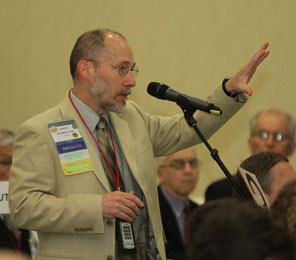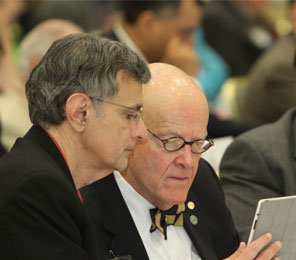 |
|
 |
|
|
At the Massachusetts Medical Society’s House of Delegates meeting held in Boston on May 19, James Broadhurst (top photo) testified against the legalization of medical marijuana, as did Leonard Morse (above right), pictured here conferring with Dale Magee, MD. PHOTOS COURTESY OF MASSACHUSETTS MEDICAL SOCIETY |
It is official: A non-binding referendum question asking voters whether medical marijuana should be legalized will be on the Massachusetts ballot this November. But according to UMass Medical School experts James Broadhurst, MD, assistant professor of family medicine & community health, and retired faculty member Leonard Morse, MD, doctors should not be involved in prescribing the drug until marijuana is fully evaluated for safety and efficacy and approved for use by the Food and Drug Administration (FDA), and is no longer considered a Schedule I controlled substance by the Drug Enforcement Agency (DEA).
“Physicians have no business being involved in the marijuana business,” said Dr. Broadhurst. “Marijuana is not medicine.”
Other doctors in the state agree. In fact, Broadhurst and Dr. Morse crafted one of the five resolutions opposing legalization of medical marijuana that were approved by the Massachusetts Medical Society (MMS) in anticipation of November’s ballot. The resolutions urge reclassification of marijuana by the DEA to permit research and regulation by the FDA; articulate the need to develop non-smoked, reliable delivery systems for research purposes; call for efforts to make the public understand that there is insufficient scientific information about the safety of marijuana when used for medicinal purposes; and affirm that, until scientific studies demonstrate its safety and efficacy, Massachusetts physicians should not direct patients’ use of medical marijuana.
Morse also authored “Medical Marijuana: The Cart Before the Horse” for the May/June 2012 issue of Worcester Medicine, the magazine of the Worcester District Medical Society. “The medical profession needs to be educated based on clinical studies, not just personal testimony, and to learn the routes of responsible prescribing,” he wrote. “The pharmaceutical industry and the medical profession should become involved in product development, clinical testing and physician education before medical marijuana becomes legalized.”
Long dedicated to primary care, public health and organized medicine, Broadhurst and Morse have invested much time and effort to clarify the many implications that legalizing medical marijuana holds for the medical profession and patient care. “Involvement in organized medicine can be very useful when we have an issue we want to highlight,” noted Broadhurst, who joined the WDMS and the MMS while still a medical student. “I put in a resolution because I want us to have a policy that puts physicians in the middle of the debate, and not standing on the sidelines.”
Related links on UMassMedNow:
Silk’s oral health resolution adopted by MMS
Tomorrow’s doctors become today’s leaders in American Medical Association